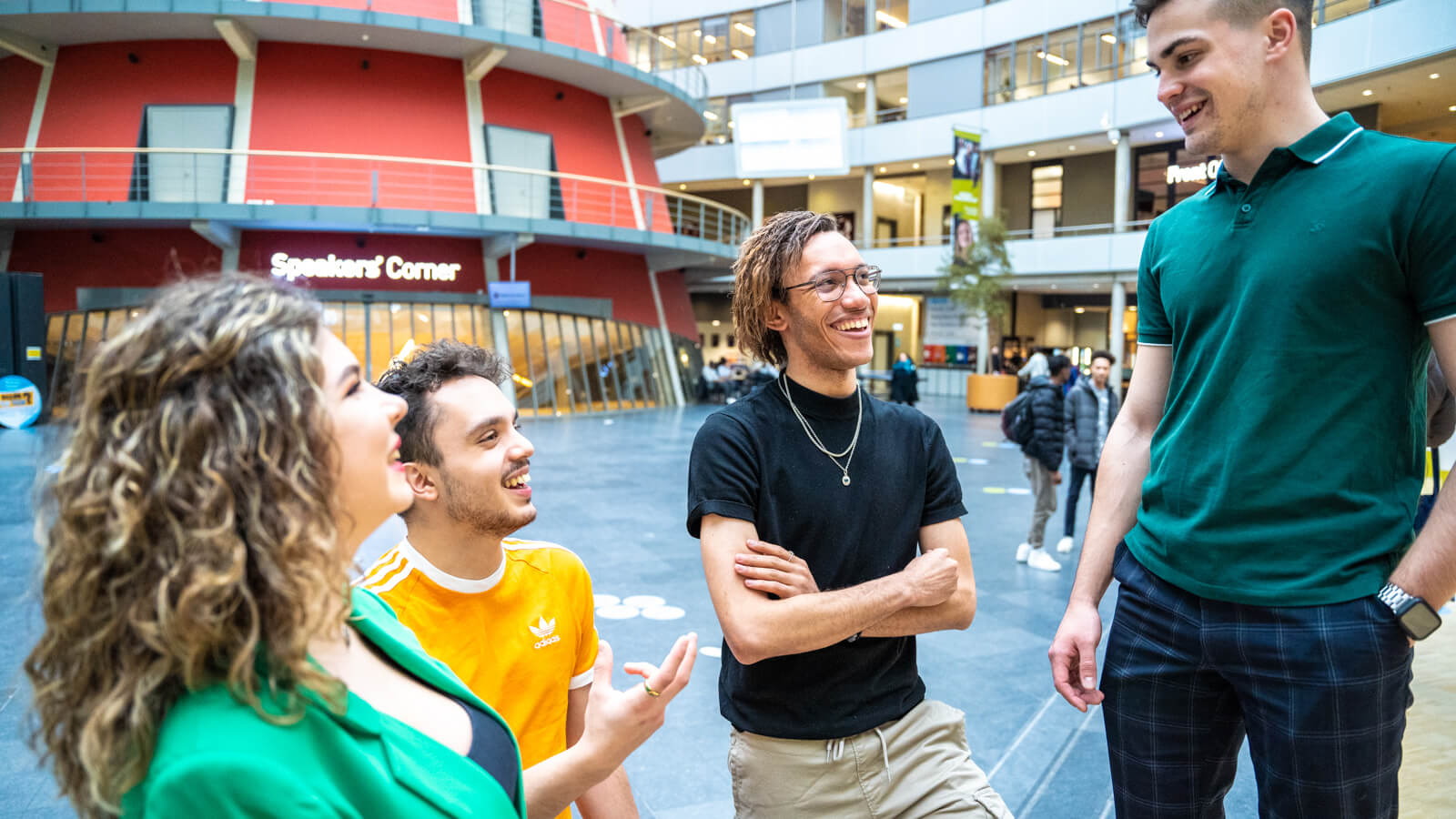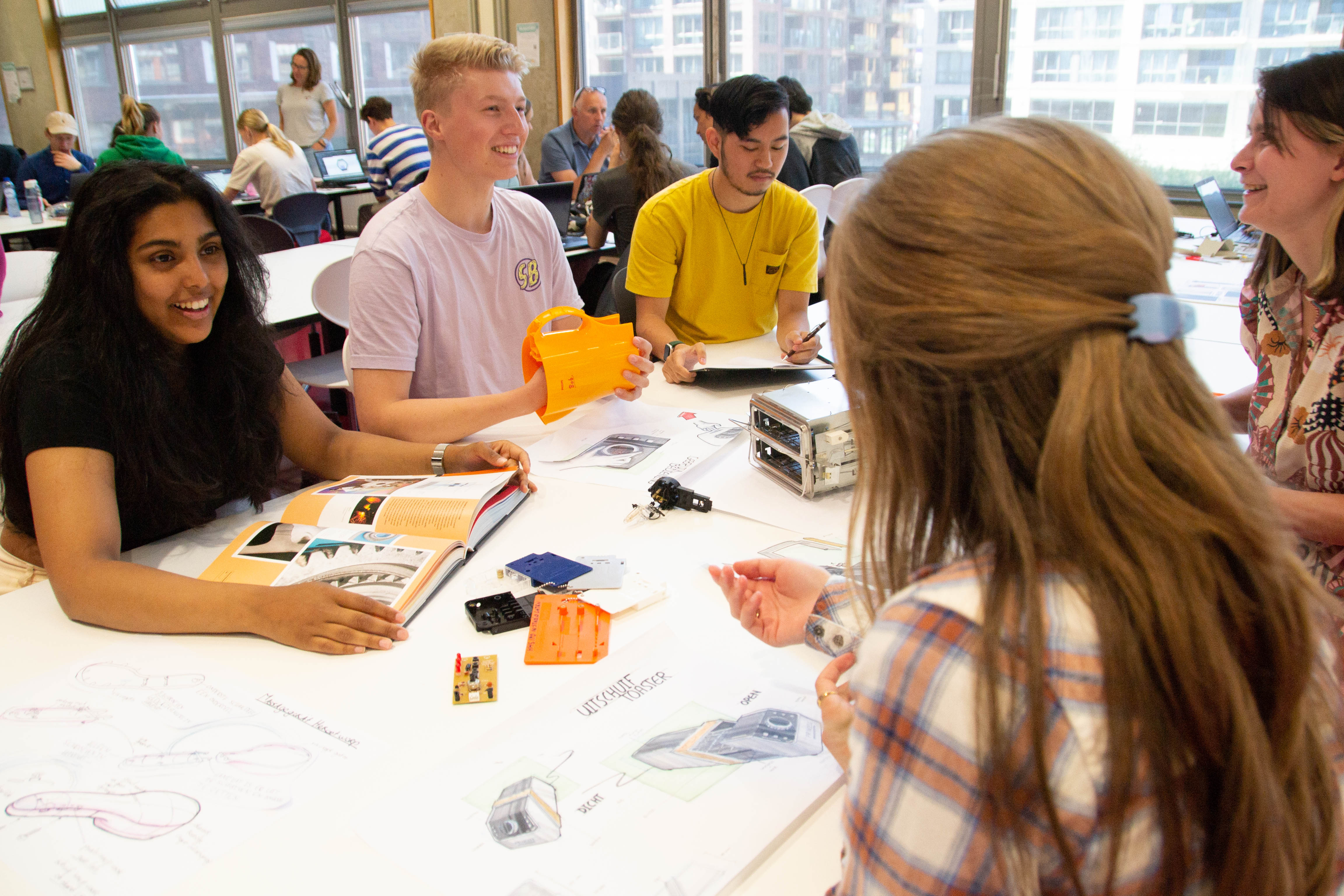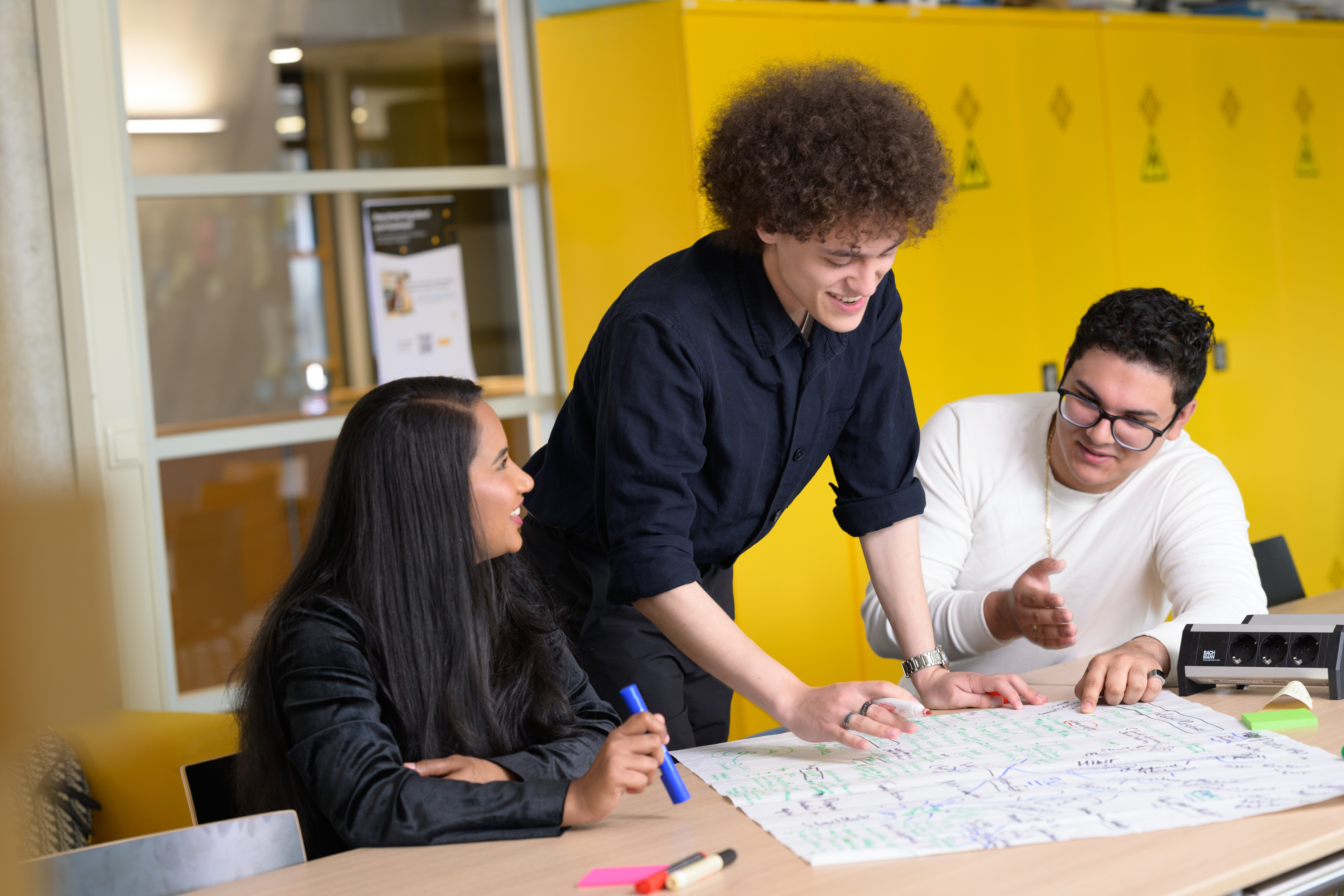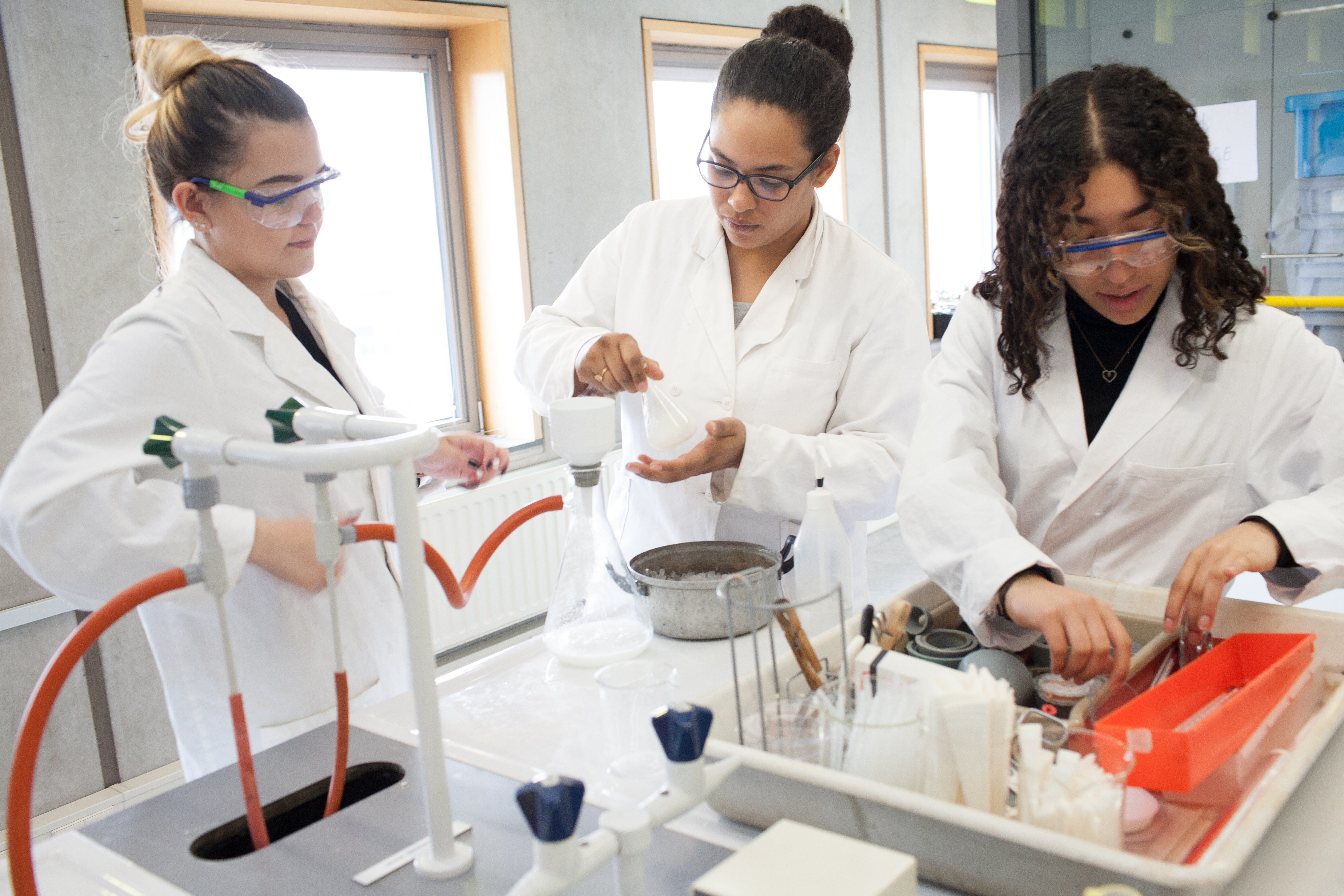For you?
Ever wonder how IKEA became the largest and most popular furniture retailer in the world? Well, it might have to do with the fact they let groups of users share their experience of the products and then created sustainable furniture to suit their needs.
Co-creation has become a reality for every professional productdesigner, and it’s second nature to our IDE students at The Hague University of Applied Sciences (THUAS). Anyone can come up with a ground-breaking idea. But IDE teaches you to funnel your creativity by collaborating with all stakeholders, taking ethics and other cultures into account and making a positive impact with the launch of your project. All IDE semesters are integrated projects for real clients supported by training in skills and methods.
By following the same design process with each project, you will feel more and more confident. Every time you will be working on something completely different: a funny toilet roll holder, new playground equipment for a school yard, or an interactive museum exhibit to help children understand energy grids. You may even use nature (biomimicry) to come up with a solution for waste in the canals. Also good to know: our programme is very international. In year 1 alone, there are 27 nationalities!
Want to know what projects we work on? Follow us on Instagram and TikTok.
Admission requirements
You have a Dutch diploma
| Preliminary education | Required profile |
|---|---|
| Havo (senior general secondary education) | Does not qualify for admission |
| Vwo (pre-university education) |
|
| Mbo (senior secondary vocational education and training) | Does not qualify for admission |
You have a non-Dutch diploma
To enrol for the IDE 3 year programme you will need a secondary school diploma comparable to a Dutch VWO diploma and a good command of English.
Also, you need to have passed your exam in mathematics.
Before we can decide on your eligibility, we’ll need to assess your secondary school certificate.
To make sure your certificate is evaluated fairly, we work with NUFFIC, an organisation that specialises in the assessment of international education qualifications.
Language requirements
If you were not educated in the Netherlands you usually have to submit a language test to be admitted. Depending on the type and country of your diploma you may however qualify for exemption. Please check our entry requirements page for more information.
Don’t meet the entry requirements?
Perhaps your academic background is not quite the right level. Or you need some help improving your English skills. Don’t worry. There might be some alternative options to help you get in, and prepare yourself for a successful start of your studies at The Hague University of Applied Sciences (THUAS).
Admissions Test 21+
If you’re 21 years old before 1 September 2022, but don’t have a diploma or a qualification that meets the entry requirements, you can take the 21+ Admissions Test. The 21+ Admissions Test is offered at several dates between January and the start of the academic year, and consists of a digital general capacity test. Please note that you can only participate if you have an EEA-nationality or residence permit for the Netherlands that is valid on the test date.
English Academic Preparation Programme
Need help with your English? If you haven’t quite reached the right level of English for your chosen Bachelor’s or Master’s degree programme, you can enrol for English Academic Preparation Programme. After the successful completion of this programme, you’ll be ready to start your degree at THUAS and you will already have a good taste of studying and living in the Hague.
The Hague Pathway College
If you’d like to apply for a 3-year bachelor programme but don’t meet the academic entry requirements, you might be interested in joining The Hague Pathway College. This foundation programme has two intakes, one in September and one in January. It offers you the chance to bring your academic level up to the required level and work on your English at an academic level at the same time.Please check www.thehaguepathway.nl for more information.
Decisions regarding your qualification for admission
There are no exceptions to the official admission requirements. The Enrolment Office is the only party that can make decisions regarding your qualification for admission based on official regulations. You can’t rely on any other sources of information for your qualification for admission.
Programme content
What will you study each year?
Working methods
Get ready to dive into a world of learning with lectures, seminars, self-study, and group projects! We've got an amazing 3D Protolab with 3D printers. We also have a modern workshop with a laser cutter and all the tools you could possibly need for low-fi and high-fi prototyping. This is the perfect place for co-creation! You'll be working in project groups and learning from teachers who are always happy to answer any questions you may have.
Minors
In your third year, you have the amazing opportunity to specialise as a product designer during a minor! Within THUAS you could take the Design with Nature minor or the Packaging Design & Innovation minor. Or, if you're feeling adventurous, you can explore something completely different, like a minor in photography or Spanish. You could even spend a semester at another university in or outside The Netherlands! With your minor, you'll be working on your identity as an open innovator, and you'll be ready to make a splash in the job market!
Degree programme in figures
Discover THUAS
Your guide to our upcoming study-choice events
Career perspective
What you might become
Innovation manager
Product designer
Industrial designer
Service Designer
Design thinking advisor
User researcher
Entrepreneur
Experience designer
Interaction designer
What you won’t become
Software developer
Mechanical Engineer
Graphic Designer
Architect
Continue studying
Want to pursue a master's degree after graduating from IDE? You can do so at THUAS, and it only takes one year. The Next Level Engineering master's programme in Delft is a perfect fit for IDE. Earn your master's degree in four years!
Several Dutch universities also offer interesting and fitting masters. You should note that some universities in the Netherlands, e.g. TU Delft, require you to follow a pre-master’s course after graduating from THUAS. At others you can get in right away based on your diploma and portfolio and/or motivation. You can take a master’s in design after graduation just about anywhere else in the world where a bachelor of science is accepted.
Testimonials from our students
Who better to tell about the degree programme than our own students? They share their experiences here. Some of them are also ready and waiting to answer any questions you may have.
Testimonials from our alumni
What lies in store after studying Industrial Design Engineering? Our former students tell us where they ended up and how they look back on their study years.
Testimonials from our Lecturers
Our lecturers tell you something about themselves and the educational program.
Practical information
What else do you need to know?
How to apply
Your enrolment request must be submitted through Studielink. Before you do, please check the official name of the programme below. Would you like to find out more about the application process first? Check our page How to apply . The key deadlines are listed here as well. This degree programme starts in September and there is no intake in February.
Tuition fee
You will have to pay tuition fees when you enrol on a bachelor's programme. You can pay in one or more instalments. If you pay in more than one instalment a small administration fee is charged.
More information about tuition fees
Scholarships
Find out more about scholarships for international students. Please note that these scholarships are one-off scholarships only, meaning that if you obtain them it is only for your first year of study.
Student finance
Dutch students qualify for extra financial support via a loan. Dutch students automatically qualify for this financial assistance and international students may be eligible if they have lived in the Netherlands for at least five years or are employed for at least 56 hours per month.
Additional Costs
You must also budget for books, excursions and field trips. You can expect to pay approximately €800 per year to cover these additional costs. During your semester abroad, you will also need to pay for tickets, housing and insurance.
Visa and residence permit
Help in choosing your study
We would like to help you make the right decision
It takes a bit of thought and research to find the right programme. The Hague University of Applied Sciences organizes various activities throughout the year to give you the best possible idea of the various studies offered. You also learn what it’s like to study at THUAS. This way, you can click on the registration button without a doubt in mind. Or you’ll know for certain it’s not right for you.
Walk in at our Study & Career Centre for…
Assistance during your studies
Study coaching and advice
We do everything we can to make your time on IDE run smoothly. You’ll have the support of an academic career coach, who’ll guide you as you choose semester options and develop your design portfolio and professional profile. If you’re experiencing any study problems, your coach will help you develop effective learning strategies. They can help you improve your time management skills, or find the right person to answer more complicated questions. They’ll also support you if you have any personal problems that may affect your schoolwork. For more information about student counsellors/student psychologists, high-performance sports, Dutch language support or studying with a functional disability, go to our page about support during your studies.
Official details of the programme
This degree programme is registered in Registration of Institutions and Programmes (RIO):
- Official Dutch name of degree programme: Industrieel Product Ontwerpen
- Official international name: Industrial Design Engineering
- Programme code (Isat): 34389
- Institution code (Brin): 27UM
Both the official Dutch and the official international name of the degree programme (current at the time of your graduation) will be printed on your diploma.
For more information on the accreditation of this degree programme, see the Accreditation Organisation of the Netherlands and Flanders (NVAO) website.
Looking for a different degree programme?
You might find these programmes interesting too!




